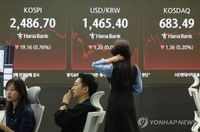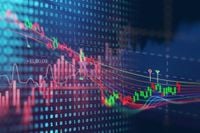On April 4, 2025, the KOSPI index opened with a significant decline, starting at 2452.41 points, down 34.29 points from the previous day. This drop is attributed to the sharp decline in the New York stock market the night before, which sent ripples through global markets. By 9:02 AM, the KOSPI had further dipped to 2452.20, reflecting a decrease of 34.50 points or 1.39% from the previous session.
The U.S. stock market closed sharply lower on April 3, 2025, due to fears surrounding mutual tariffs, prompting a wave of indiscriminate selling across major indices. As a result, the KOSPI began its trading day under pressure, mirroring the trends observed in the United States. According to Na Jeong-hwan, a researcher at NH Investment & Securities, despite the external pressures from the U.S. tariffs, the KOSPI had previously absorbed some of the Trump-related risks since last year, which may have cushioned the impact somewhat.
At 9:10 AM, the KOSPI index stood at 2458.86, reflecting a 1.12% decline from the previous trading day’s close of 2486.70. Foreign investors were net sellers, offloading 122.9 billion won, while individual and institutional investors bought 86 billion won and 35.8 billion won respectively. This indicates a mixed reaction from domestic investors amidst the global downturn.
Most of the large-cap stocks in the KOSPI were also in decline. Major players such as Samsung Electronics fell by 1.74%, SK Hynix by 4.16%, and Samsung Biologics by 1.08%. Other notable declines included LG Energy Solution (-0.48%), Hyundai Motor (-0.67%), and Shinhan Financial Group (-1.16%). The downward trend was evident across various sectors, particularly in semiconductors and semiconductor equipment, which dropped by 2.59% and 2.40% respectively.
Meanwhile, the KOSDAQ index also reflected a downward trend, opening at 677.23, down 6.26 points or 0.92% from the previous day. By 9:25 AM, it recorded a slight decrease to 677.68, down 5.81 points or 0.85%. In the KOSDAQ market, individual investors were net buyers of 59.6 billion won, while foreigners and institutions sold off stocks, with net sales of 44.5 billion won and 9.7 billion won respectively.
Despite the overall negative sentiment, some stocks in the KOSDAQ showed resilience. EcoProBM surged by 2.63%, while EcoPro climbed by 4.18%. Other gainers included Huzel, Classis, and JYP Entertainment, which saw positive movements against the backdrop of a generally declining market.
The market's decline comes on a significant date, as it coincides with the presidential election early voting in South Korea. Investors are keenly watching the developments, especially with the impending impeachment ruling of President Yoon Suk-yeol, which adds an additional layer of uncertainty to the market. The impeachment ruling is expected to be a pivotal moment for the administration, and its outcome could have far-reaching implications for the South Korean economy.
As the day progresses, analysts urge caution, advising investors to await clearer signals from the market before making significant moves. Na Jeong-hwan emphasized that while the KOSPI has shown relative strength in the face of external pressures, the upcoming events, including the impeachment ruling and the U.S. unemployment rate, are critical factors that could influence market sentiment.
In summary, the KOSPI and KOSDAQ indices are grappling with the fallout from international market trends, domestic political developments, and investor sentiment. As the trading day unfolds, all eyes will remain on the reactions from both local and foreign investors, as well as the broader implications of the political landscape on the South Korean economy.


![[개장시황] 코스피 '美 관세·尹탄핵 심판' 여파…1%대 하락 출발](https://thumbor.evrimagaci.org/Ut10zQKRkLPvWVG42NSG5i7M4X0=/200x0/tpg%2Fsources%2F98d10476-2b10-4c0a-a19e-ad2e9f6b1a70.jpeg)



